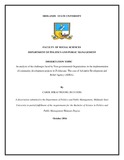Please use this identifier to cite or link to this item:
https://cris.library.msu.ac.zw//handle/11408/2267Full metadata record
| DC Field | Value | Language |
|---|---|---|
| dc.contributor.author | Teguru, Carol S. | |
| dc.date.accessioned | 2017-06-28T13:54:37Z | |
| dc.date.available | 2017-06-28T13:54:37Z | |
| dc.date.issued | 2016-10 | |
| dc.identifier.uri | http://hdl.handle.net/11408/2267 | |
| dc.description.abstract | Developing countries like Zimbabwe in the last decades have witnessed an extraordinary growth in the NGO sector in social, economic and political spheres. NGOs are non-profit agencies who are devoted to uplift the lives of the poor, underprivileged and marginalized areas and have gained a very high status as the leading practitioners of development in many African communities. Community development entails the provision of infrastructural facilities to enhance the lives of the people in terms of education and health. NGOs have filled in the gap that the government is failing to fill due to the social, economic and political problems that are in Zimbabwe. ADRA as an NGO has played a crucial role in developing rural and urban communities in Zvishavane by providing these social amenities through community development projects it implements. NGOs as an integral part of civil society are facing challenges in their bid to foster community development. The purpose of this study was to analyse the challenges faced by NGOs in the implementation of community development projects in Zvishavane in the case of ADRA. The study found out that the challenges faced are internal and external. The internal challenges being those issues within the organization’s control like human resource, leadership, absence of strategic planning and improper risk management. The external challenges comprise of political interference, government policies, political instability, funding, donor priorities changing, community members’ participation and economic instability. These challenges are hindering effective implementation of community development projects that results in project failure or partial success of projects. The study employed the mixed methods approach where both qualitative and quantitative techniques were used in the solicitation and presentation of data. Interviews and questionnaires were used for the collection of data. Thematic and content data analysis methods were used in the study for data analysis. Ethical considerations were also observed by the researcher in the study. The researcher concluded that the external challenges are the ones affecting the successful implementation of community development projects to a greater extent hence she proffered recommendations to the government to regulate its relations with NGOs as well as the community members to work together with NGOs for the sake of development. | en_US |
| dc.language.iso | en | en_US |
| dc.publisher | Midlands State University | en_US |
| dc.subject | Non-Governmental Organisations | en_US |
| dc.subject | Community Development | en_US |
| dc.subject | Zvishavane | en_US |
| dc.subject | Adventist Development And Relief Agency (ADRA) | en_US |
| dc.title | An analysis of the challenges faced by non-governmental organizations in the implementation of community development projects in Zvishavane: the case of Adventist Development and Relief Agency (ADRA) | en_US |
| item.languageiso639-1 | en | - |
| item.grantfulltext | open | - |
| item.fulltext | With Fulltext | - |
| Appears in Collections: | Bachelor Of Science In Politics And Public Management Honours Degree | |
Files in This Item:
| File | Description | Size | Format | |
|---|---|---|---|---|
| Carol Sekai Teguru.pdf | 827.98 kB | Adobe PDF |  View/Open |
Page view(s)
150
checked on Apr 30, 2025
Download(s)
86
checked on Apr 30, 2025
Google ScholarTM
Check
Items in MSUIR are protected by copyright, with all rights reserved, unless otherwise indicated.



